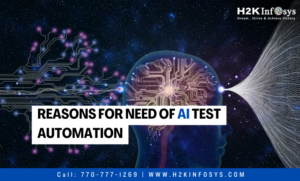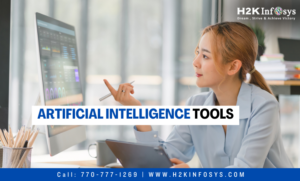Deep learning specialists are responsible for creating, deploying, and maintaining complex artificial intelligence models employing deep learning frameworks. They use a variety of programming languages, frameworks, and libraries to create programs that can learn from data, identify complicated patterns, and make precise predictions.
Deep learning professionals, who prioritise testing and cooperation, play a critical role in revolutionising AI technology and developing systems that solve problems across multiple domains.
This article can help you become familiar with basic words and enhance your deep learning concepts. Check out our Artificial Intelligence training online to learn more.
Importance of Grasping Deep Learning Terminology
Understanding Deep Learning terms is required to fully grasp the possibilities of artificial intelligence and explore the realm of neural networks. Here’s why getting your hands on these terms is important.
Effective Communication
Deep learning professionals commonly collaborate on interdisciplinary teams. A shared understanding of terminologies such as convolutional neural networks (CNNs) or long short-term memory (LSTM) networks facilitates successful communication, cooperation, and idea exchange.
Accuracy of implementation
Deep learning computations have several components, ranging from layers and nodes to activation functions. An accurate understanding of these terms is required for implementing and fine-tuning neural networks. Mastery of language enables experts to select the best architecture and parameters for optimal results.
Investigating and Debugging
Deep learning models may encounter challenges during training or deployment. Terminology is critical for good troubleshooting. Understanding these terminologies is required to identify problems with loss functions, gradients, and overfitting.
Stay current with advancements.
Deep learning is a rapidly expanding discipline with numerous achievements. Keeping up with the latest research articles, methodologies, and models necessitates a thorough mastery of the relevant vocabulary. This information is critical for incorporating modern techniques into AI applications.
AI applications can improve collaboration across domains, including health care and finance, with endless possibilities. Experts working across domains should be able to overcome any communication barriers. A shared language facilitates collaboration between AI specialists and domain professionals, resulting in successful solutions to problems.
Understanding Research Papers
Deep learning research papers are replete with technical terminology and concepts. To grasp and use cutting-edge tactics, specialists and experts must have a thorough comprehension of terminology. This potential takes into account the implementation and interpretation of research.
Career Advancement
Experts having a strong understanding of deep learning are highly valuable in artificial intelligence. Employers need people who can run models, interpret and make sense of their decisions, and do it in the domain’s vernacular. The dominance of terminology promotes professional achievement and recognition.
Future of Deep Learning and Continuous Learning
The future of deep learning promises significant improvements driven by continual learning, technical innovation, and the increasing integration of artificial intelligence into other fields.
Deep Learning and Architectural Innovations
Future advances may include neural network topologies that go beyond conventional models. Capsule networks, attention processes, and graph neural networks are anticipated to play essential roles in constructing complicated links in data.
Transfer Learning and Pre-training
Transfer learning and pre-training will continue to be important. Models pre-trained on large datasets can be employed for a variety of tasks, improving execution and productivity, especially in scenarios with minimal labelled data.
Explainable AI (XAI)
As artificial intelligence frameworks become more advanced, the need for explainability grows. Future advancements in XAI will concentrate on making deep learning models more interpretable, uncomplicated, and accountable.
Integration of Other Technologies
Deep learning will be better integrated with newer technologies such as quantum computing, edge computing, and 5G networks. These connections attempt to improve performance, productivity, and availability.
Ethical AI and Inclination Mitigation.
Addressing ethical challenges and biases in artificial intelligence models will be a primary topic. Continued attempts to design fair and unbiased algorithms will help to ensure responsible AI implementation across a variety of applications.
Continuous Learning
Lifelong Learning Models
The advancement of lifelong learning models enables artificial intelligence frameworks to adjust and acquire knowledge in the long run, similar to human learning processes. This works with better execution in some circumstances.
Online and Gradual Learning
Online and gradual learning methods will improve in quality. Models will continuously learn from new data, adapting to changes and updates without requiring thorough retraining.
Self-Administered Learning
Self-administered learning, in which models generate names from existing data, enables continuous learning without requiring large labelled datasets. This strategy helps models acquire new information as data streams.
Adaptive Learning Systems
Future frameworks will significantly alter their learning procedures in response to changing data distributions and developing challenges. This adaptability is critical for artificial intelligence frameworks to maintain relevance over time.
Conclusion To learn more about AI and Deep Learning, check out our AI specialist training.





























